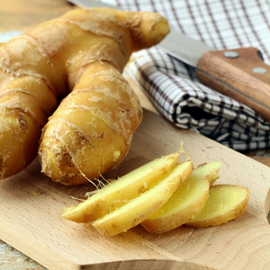What your GERD surgeon in Macon and Atlanta has to say about ginger’s medicinal and culinary properties for heartburn

If you’ve visited a GERD surgeon in Macon or Atlanta, you’ve probably tried just about everything to get your symptoms to stop. Acid reflux and heartburn can be painful problems, and reflux surgery is the only surefire way to rid yourself of them for good. However, the Internet is awash with countless suggestions to control and reduce GERD symptoms—some of them are more accurate than others.
You may have heard about ginger’s ability to settle the stomach, and we’ve even written a blog about soothing heartburn with ginger tea, but the root’s uses go far beyond that. Used correctly, ginger can be a valuable addition to many meals and may even help you fight and prevent GERD.
GERD & Ginger: The Connection
Though ginger has been used medicinally for thousands of years, we are now beginning to understand the clinical reasons behind its effectiveness. In addition to relieving reflux-related inflammation, ginger can help to reduce reflux by soaking up excess stomach acid. Ginger’s ability to ease the digestive process is well-known—the root makes movement through the intestines easier and is even recommended as a treatment for childhood dyspepsia, a stomach condition with no other conventional methods of treatment.
Ginger has been approved as a complement to acid reflux treatment by many experts, but you should still ask your GERD surgeon if ginger will help your symptoms before introducing it to your diet. If your GERD surgeon gives you the go-ahead, try adding some ginger to your diet in these ways:
- Tea. As we’ve already mentioned, ginger tea can be a great at-home reflux remedy. Ginger tea has a relaxing effect and, like most herbal teas, has no caffeine to exacerbate your symptoms.
- Sliced or minced. Fresh ginger root can be sliced and added to a variety of dishes like stir fry or roasted vegetables. With a refreshing and warm flavor, ginger works well as a complement to vegetables and protein—it can even be used as the dominant flavor of a dish. Try peeling fresh ginger root, then cutting it into matchstick-sized pieces to add both texture and flavor to a rice or vegetable dish. Mincing ginger will help you further infuse a dish with its flavor.
- Grated. Ginger’s powerful flavor can be harnessed for a variety of purposes—for evidence, just look at ginger ale or gingerbread. You can use ginger in many ways by grating and adding it to sauces. A ginger-infused sauce can complement proteins like salmon nicely, but can also be used for dipping vegetables. You can even mix ginger with maple syrup for a sweet, warm glaze for veggies or meats.
Ginger can be a valuable ally in your anti-reflux diet, adding both flavor and relief. Has ginger helped you deal with the symptoms of GERD? Tell us about your favorite ways to use ginger in the comments below!

Leave a Reply